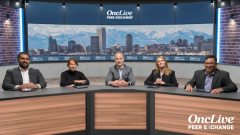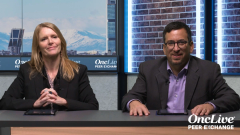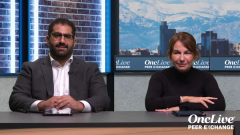
Antibody-Drug Conjugates in EGFR-Mutant NSCLC
The panel discusses the use of antibody-drug conjugates for patients with EGFR-mutant non–small cell lung cancer, with a focus on the HERTHENA-Lung01 and TROPION-Lung05 studies.
Episodes in this series

This is a synopsis of a Peer Exchange video series featuring Benjamin P. Levy, MD, of Sidney Kimmel Comprehensive Cancer Center at Johns Hopkins; Solange Peters, MD, PhD, of University Hospital of Lausanne; Joshua K. Sabari, MD, of NYU Langone’s Perlmutter Cancer Center; Edward B. Garon, MD, MS, of UCLA Jonsson Comprehensive Cancer Center; and Marina Chiara Garassino, MD, of University of Chicago Medicine Comprehensive Cancer Center.
The speakers, including Dr Joshua K. Sabari, assistant professor of medicine at NYU Langone Health, discussed emerging treatment options for epidermal growth factor receptor (EGFR)–mutant non–small cell lung cancer (NSCLC) after progression on osimertinib. Dr Solange Peters reviewed data on the antibody-drug conjugate [ADC] patritumab deruxtecan (HER3-DXd) from the HERTHENA-Lung01 trial in EGFR NSCLC progressing after osimertinib and platinum chemotherapy. She reported an objective response rate of approximately 30% which appears promising compared to single-agent chemotherapy options like docetaxel in this later-line setting. Unusually, efficacy was also observed in patients with baseline brain metastases. Dr Sabari discussed the TROPION-Lung05 study of another antibody-drug conjugate, datopotamab deruxtecan (Dato-DXd), which demonstrated a 43% response rate with notably higher activity in patients with common EGFR activating mutations. Both speakers suggested that the improved efficacy of these ADC therapies may relate to the presence of an oncogenic driver mutation.
Potential future applications of HER3-DXd and Dato-DXd were debated, including use instead of or added to chemotherapy plus amivantamab in the MARIPOSA-2 regimen for patients with EGFR-mutant NSCLC progressing on osimertinib. Combinations with osimertinib in earlier lines were also considered but may be limited by toxicity concerns. Overall, ADC therapies are demonstrating encouraging efficacy in biomarker-selected populations in lung cancer, contributing to rapidly evolving treatment paradigms and complicating clinical trial development. But these therapeutic advances ultimately benefit patient outcomes. Speakers concurred that data from multiple ongoing studies of both ADCs and combinations incorporating amivantamab will better define optimal sequencing strategies as more treatment options emerge for EGFR-mutant NSCLC.
*Video synopsis is AI-generated and reviewed by OncLive editorial staff.







































